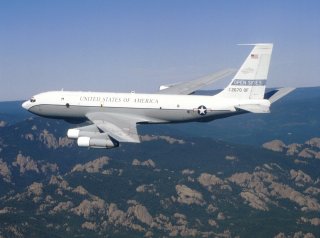Why the Air Force Won’t Buy New Open Skies Planes
They’re just too old—and the Trump administration is leaving the treaty—though Open Skies might not be dead just yet.
The Air Force officially announced the cancellation of its Open Skies Treaty Aircraft Recapitalization (OSTAR) program. The OSTAR program sought to purchase two newer commercial airplanes to replace their aging OC-135B Open Skies planes, which have been in operational service since the early 1990s.
The Open Skies Treaty is a confidence-building measure that allows signatory countries who have also ratified the treaty to conduct observation flights over each other’s territory. There are currently 34 parties to the treaty. Treaty signatories affirm that the entirety of their territory can be overflown for observation, including territorial waters and anywhere where sovereignty is exercised. The treaty also stipulates that observation flights may only be curtailed or canceled for reasons of flight safety, for example, due to inclement weather.
The Open Skies Treaty was originally proposed by President Dwight Eisenhower in 1955 to reduce Cold War tensions, though at the time the Soviet Union flatly rejected the offer. As an idea, the treaty was proposed a second time in the late 1980s around the time the Soviet Union was collapsing, though it was not until 2002 that the treaty went into force after being ratified in the early 1990s.
Birds in the Sky
The two current American Open Skies airplanes are modified WC-135Bs built by Boeing. They are equipped with high- and low-altitude wet-film cameras, infrared ground scanners, and both downward- and flank-facing scanned aperture radar. Camera resolution is said to be comparable to commercial satellite imagery like that offered by Google Earth. All airplanes that conduct observation flights must pass pre-flight inspections done by the country being overflown and onboard observation equipment must also pass inspection.
Although the United States’ current satellite suite offers the same if not better resolution, many of the countries that signed and ratified the treaty lack the space-based observation sophistication of the United States and rely on the treaty’s information-sharing clause for overhead information. This is the treaty’s greatest strength.
Bound by Treaty
After a flight is conducted a copy of all data collected is given to the country that was overflown, and countries not involved with the flight are given a detailed flight report. Importantly, any treaty ratifier is entitled to the observation data of any other treaty ratifier, at the mere cost of reproducing the film or video collected.
Both Russia and the United States have quibbled in the past about the treaty, accusing each other of non-compliance. Russia placed restrictions for flights over Kaliningrad, the heavily-fortified Russian exclave sandwiched between Poland and Lithuania on the Baltic Sea and has also placed restrictions over South Ossetia and Abkhazia, which Russia recognizes as independent, though both territories are seen by most countries as parts of Georgia. In response to the Russian flight restrictions, the United States curtailed Russian flights over Hawaii’s Pacific Fleet, and a missile interceptor complex near Fort Greely, Alaska.
Open Skies
But, all is not lost. Democratic presidential nominee Joe Biden affirmed his support for the treaty, saying that disputes can be ironed out within the treaty framework, rather than by withdrawing completely. “These Russian violations should be addressed not by withdrawing from the Treaty, but by seeking to resolve them through the Treaty’s implementation and dispute mechanism.”
Biden emphasized the utility of Open Skies, saying “Instead of tearing up treaties that make us and our allies more secure, President Trump should take common-sense steps to keep Americans safe. He should remain in the Open Skies Treaty and work with allies to confront and resolve problems regarding Russia’s compliance.” We’ll see what November brings.
Caleb Larson is a Defense Writer with The National Interest. He holds a Master of Public Policy and covers U.S. and Russian security, European defense issues, and German politics and culture.
Image: Wikimedia Commons

